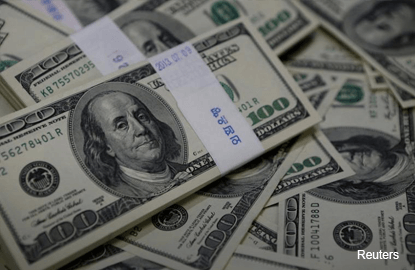
TOKYO (Jan 18): The dollar took a breather on Wednesday after falling to a seven-week low against the yen, as investors await Federal Reserve Chair Janet Yellen's speech on monetary policy, while sterling gave back some of the previous session's rally.
The greenback added 0.4% to 113.05 yen, after hitting a seven-week low of 112.57 yen. The yen had strengthened for seven straight sessions.
The dollar index, which measures it against a basket of six major peers, last stood at 100.50, up 0.2%, after falling to 100.26 on Tuesday, its lowest since Dec 8.
The euro slipped 0.2% to US$1.06970, after it hit a high of US$1.07195 on Tuesday, its highest since Dec 8.
Yellen's speech later on Wednesday, to the Commonwealth Club in San Francisco, could offer clues about the direction of policy.
San Francisco Federal Reserve Bank President John Williams on Tuesday said he sees a "good case" for three rate hikes this year, even without any fiscal stimulus, but if the economy accelerates, the Fed would need to raise rates faster.
Fed Governor Lael Brainard on Tuesday joined the growing chorus of policymakers at the Fed warning that sustained wider budget deficits could fuel inflation.
Investors also awaited the U.S. consumer price index due later on Wednesday. According to a Reuters survey of economists, the CPI probably advanced 0.3% last month, after gaining 0.2% in November.
Sterling slipped 0.6% to US$1.2341, a day after posting its biggest one-day percentage gain since at least 1998, after British Prime Minister Theresa May outlined her 'Brexit' plans.
May pledged to hold a parliamentary vote on whatever deal Britain eventually reaches to leave the European Union. As expected, May said Britain will pull out of the EU's single market when it exits the bloc and not look for a compromise deal to retain some of its benefits.
Sterling rose by about 3% against the dollar on Tuesday, touching US$1.2416, its highest level in nearly two weeks.
However, some analysts say much of pound's gain was due to the dollar's broader fall.
"Markets cannot be too optimistic about the UK parliament having the final vote. Brexit, hard or not, will weigh on the UK economy," said Masashi Murata, currency strategist at Brown Brothers Harriman.
"The pound is still on a downward trend according to the technical analysis, compared to the highs marked in September and December last year," Murata added. The sterling marked highs of US$1.3445 in September and US$1.2775 in December 2016.
On Tuesday, a sell-off in the dollar had deepened as U.S. traders returned from a long weekend after Martin Luther King Jr Day and reacted to President-elect Donald Trump's weekend comments. In an interview with the Wall Street Journal, Trump said U.S. companies "can't compete with (China) now, because our currency is strong and it's killing us."
The dollar had surged at the end of 2016 on expectations that Trump's proposed fiscal stimulus would boost growth and inflation. But on the other hand, Trump has also continued to strike a harsh tone toward Beijing, and his protectionist rhetoric is beginning to play a larger role in investors' expectations.
A senior adviser to Trump also warned on Tuesday about the risk from a stronger dollar. Anthony Scaramucci of Skybridge Capital said "we need to be careful about the rising currency" at the World Economic Forum in Davos.
Junya Tanase, chief forex strategist at J.P. Morgan in Tokyo, said "If the U.S. government officials further talk down the dollar, the greenback could weaken and the correlation to the interest rate differentials may end."
Higher U.S. Treasury yields had fuelled demand for the dollar relative to currencies such as the euro and yen.